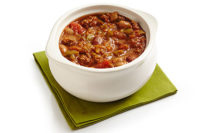Not all bacon is created equal. Sure, the consumer love affair with bacon shows no sign of relenting, so any bacon product that reaches the marketplace stands at least a decent chance of finding an audience.
However, some processors have taken their bacon offerings a step or two above the norm, creating something that separates them from the competition.
Creating a specialty bacon product doesn’t require exotic flavors or spice blends. North Country Smokehouse, located in Claremont, N.H., has been approached with offers to produce several kinds of flavored bacon in the past, but owner Mike Satzow prefers to think of bacon as a canvas.
“A chef can take our bacon and make some wonderful things with it, and we like to keep that canvas as plain as possible,” he says.
Satzow points out that there are companies that can produce a million pounds of bacon a day, and they do a good job of it.
“What I try to do is focus on the luxury item, the one that will allow the chef to be creative,” he says. “That’s where the majority of our product goes.”
As a third-generation butcher, Satzow notes that his family has played the commodity game for years. Rather than compete for pennies per pound, he says he prefers to find new products and introduce them to an appreciative audience. Several of the company’s bacon items are regional favorites or products that have fallen out of favor. Peameal bacon, for instance, is popular in the Toronto area, but North Country Smokehouse has found an audience for it in the Northeastern U.S. Peameal bacon is similar to Canadian bacon but hasn’t been cooked or smoked, and it’s been rolled in corn meal.
Similarly, the company offers a cottage bacon, an older type of bacon that’s round. As such, it fits perfectly on top of a hamburger patty, and has become a popular item for North Country.
“When you put cottage bacon on top, you don’t have to worry about the two strips of bacon you would normally put on a burger falling off to one side or what have you,” Satzow says. “”You’re getting that flavor throughout every bite.”
On the other side of the equation, Bear Creek Smokehouse has found success with bold bacon-related products. The four-generation family business operates a 45,000-square-foot facility in Marshall, Texas, that produces a variety of meat products, including bacon, hams, turkeys and more. The building also houses a dry-goods operation that produces soup, dip and chili mixes, and a confectionary operation for desserts. With that amount of product capabilities under one roof, it’s no surprise that the company decided to experiment with a product it calls Bacon Bark.
“In our confectionary division, we were making a product called Peppermint Bark, which we were selling during the holidays,” explains Robbie Shoults, president of company. “We were brainstorming one day about the possibility of using bacon with chocolate. Since we are a USDA facility, we felt it would be an easy product to move forward with, and it was.”
Bacon Bark, which is sold primarily through specialty-food stores nationwide, combines Guittard milk chocolate with bacon bits made from Bear Creek’s own bacon. The result is a sweet chocolate bar mixed with the smoky taste of bacon. The product is under USDA jurisdiction because of the bacon, so Bear Creek added a chocolate melter and a cooling belt in the portion of the plant that is inspected by the USDA. (the company’s dry goods and confectionary sections are inspected by the FDA.)
Bear Creek also has added a bacon Jam, which is manufactured for Cookwell & Co., an Austin company that distributes the jam to a major retailer in Texas.
“It’s a great, savory product,” Shoults says. “A lot of people use it on hamburgers, and you can also use it on a baked potato or with stir-fry or grilled vegetables. It’s also good just with a block of cream cheese and some chips and crackers.”
Cookwell offers a line of sauces through another manufacturer, but due to the bacon content in the jam, the company sought out a Texas company that could produce the item in a USDA facility. After some discussion, Bear Creek added a bottling line to its facility and started producing bacon jam. So far, the product has been wildly successful.
“We’ve been running it six days a week, and we actually need to be running it seven,” Shoults says. “We’ve got more than 100,000 jars on order right now. We’ve just tried to find things that will continue to contribute and help pay overheads, and it’s really paid off.”
Practice makes perfect
The beauty of bacon is that it is so versatile. Dr. Joe Cordray, professor of Animal Science at Iowa State University, notes that the biggest thing to happen to bacon in recent years was its evolution from a breakfast food to an item used in many different meals. He notes that bacon can work well with a variety of flavor profiles, for any company looking to develop a specialty bacon of its own.
“The flavor of bacon naturally is very complementary to a wide variety of popular seasonings, everything from the sweet to the spicy to the savory,” he says. “The one thing that probably doesn’t work is the extreme — too salty, too sweet or too spicy.”
A little experimentation is the key to finding a winning product. Bill Dayton, co-owner of Dayton Meat Products of Malcom, Iowa, says that he frequently experiments with different flavors on his company’s bacon. His family members/employees (eight of the 10 employees are directly related) make for a good test panel, and he says that if they like a new flavor, it stands a good chance of taking off with his customers.
“I never thought we would sell any jalapeno bacon, but we have quite a demand for it,” he says. “If I don’t have any on the shelves, then I get people upset.”
Bacon is becoming one of the biggest products that Dayton Meat Products produces, and its success is not just because of the specialty flavors. The company has done very well when entering its products in state and national cured meat competitions. Most recently, its bacon was a Grand Champion in the Iowa Meat Processors Cured Meats Competition and a Reserve Grand Champion in the Heavyweight Bacon category at the 2012 American Cured Meats Championships.
One of Dayton’s early efforts resulted in a Cajun bacon, which has become so popular that a wholesaler has put the product in supermarkets around central Iowa. An apple cinnamon bacon, which Dayton says smells like apple pie as it’s being fried, appeals to customers who want a little sweetness with their bacon.
Not every experiment paid off.
“We played with a coffee-flavored bacon. We were trying to get that morning jolt and bacon all at the same time, but it was just a little too bitter,” he says. On the more successful side, Dayton took the company’s apple cinnamon bacon, added some habanero peppers to it, and ended up with a Sweet & Sassy bacon that is selling well.
Creating a top-of-the-line bacon takes extra effort. Dayton points out that presentation is a key factor in purchasing bacon, so the product has to look good in the case.
Many specialty bacon products use toppings to both catch the eye and impart a particular taste to the product. Cordray says that the application of those toppings requires care, or else they won’t adhere to the product as well. If a processor is making a small batch, those toppings can be applied manually after the belly has been pumped but before going into the smokehouse. Spice sheets can also be applied to the bellies, which will transfer the spices onto the meat surface.
“Very easily, it also could be done in a tumbler,” he adds, noting that tumbling the bellies for a short time can add a protein coat on the outside to help hold those topical seasonings.
“Put the seasonings in there and tumble it for a period of time, and you get a really nice uniform coating over the whole belly,” Cordray says.
The most important factor in producing good-quality bacon is to start with a good pork belly. Satzow points out that North Country Smokehose does not negotiate on price for its bellies, but rather on quality.
“We have a long-standing relationship with a packer that delivers us a high-quality belly throughout the year. We pay a premium for that belly, but we charge a premium, so that allows us to secure our market niche,” he says.










